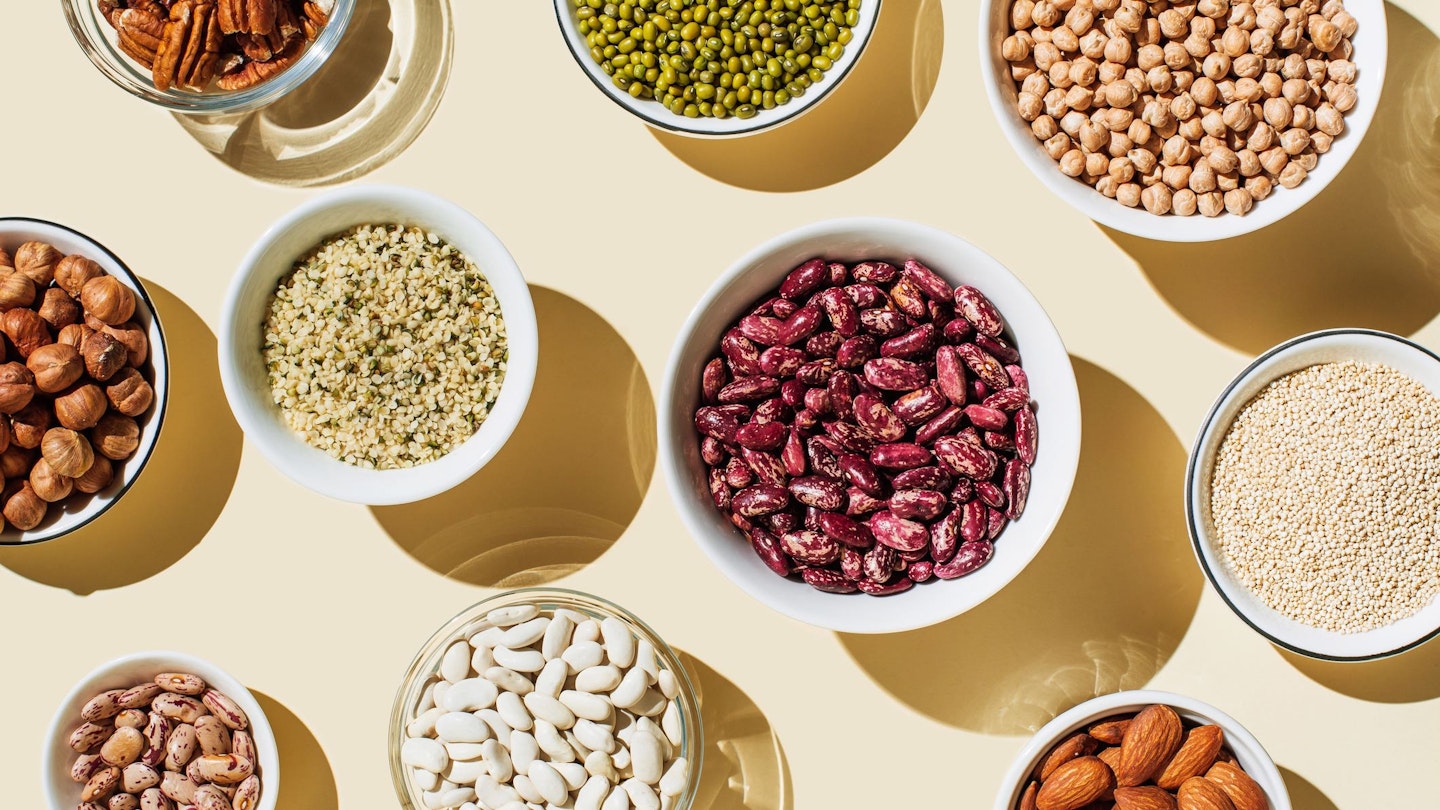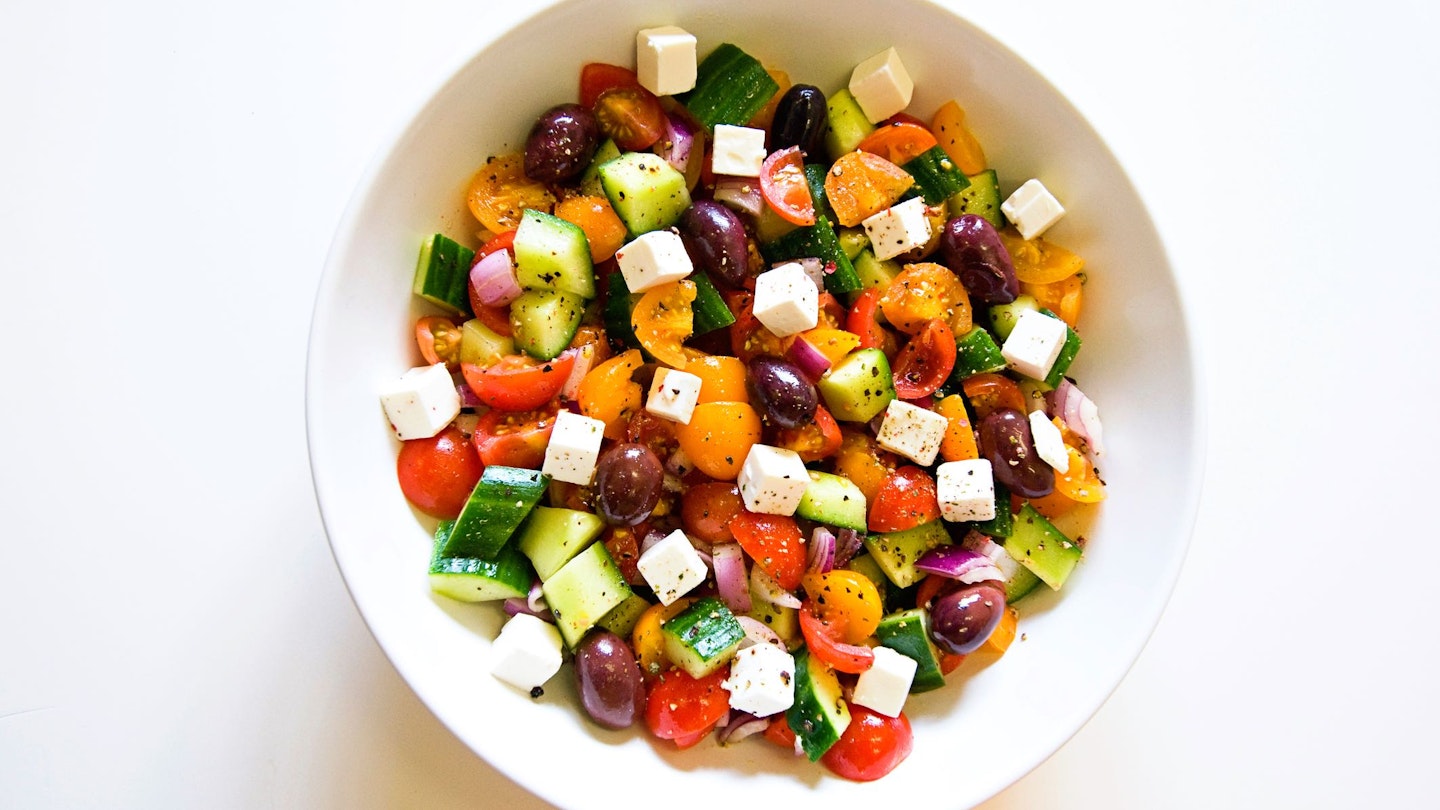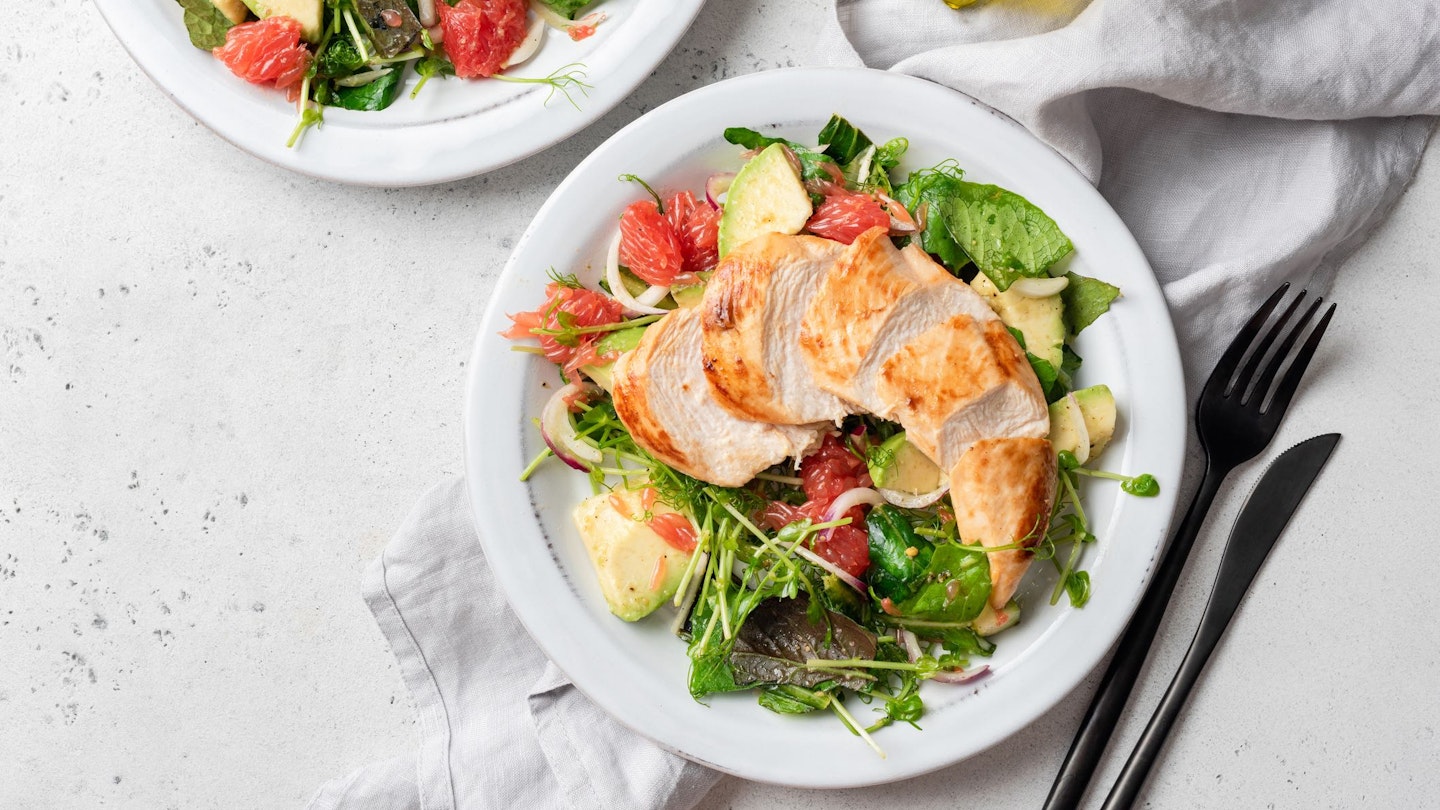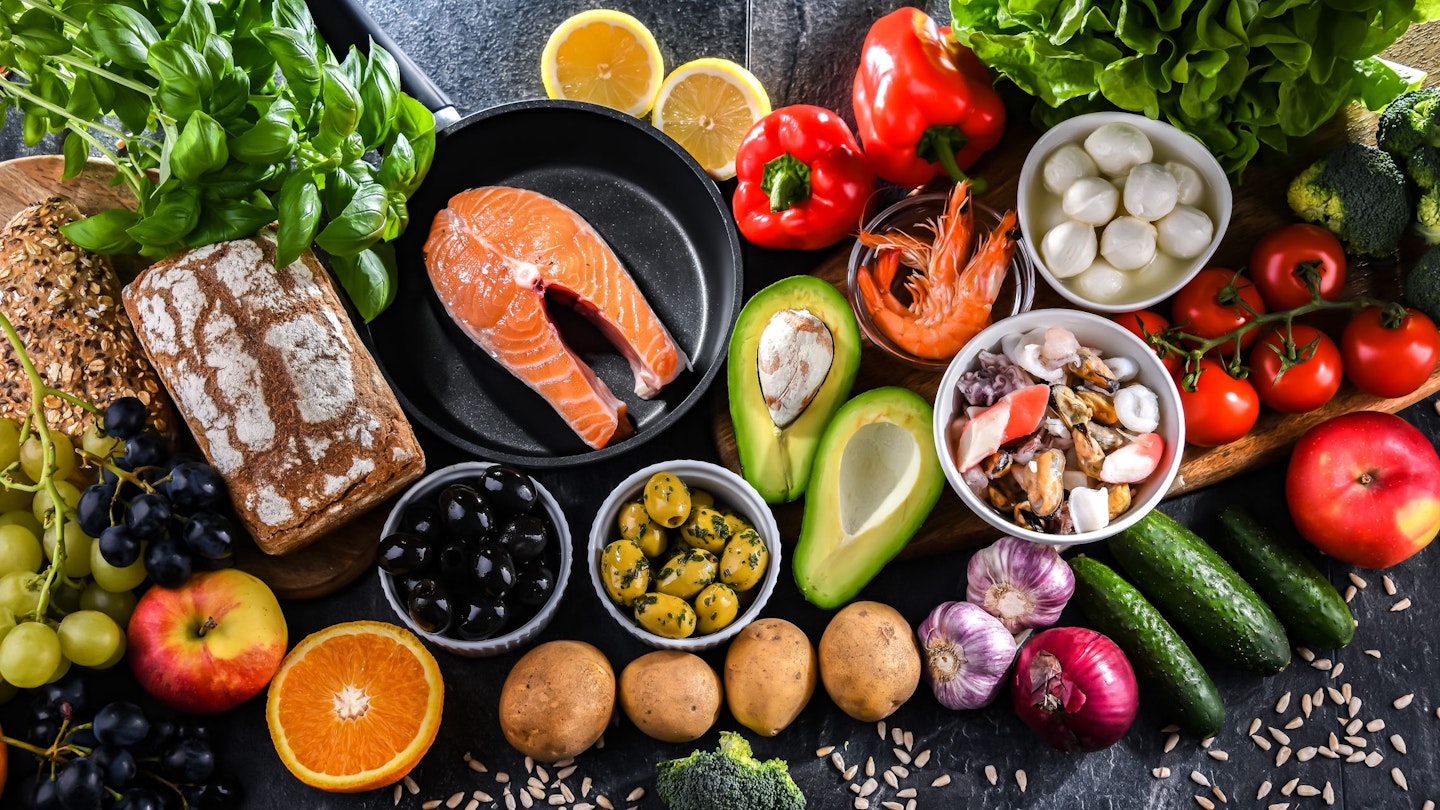Is it possible to control menopause symptoms and even reverse the ageing process through food?
Ageing is a privilege, and here at Yours we like to embrace that in every way. But it’s also undeniable that the ageing process does mean we need to take care of ourselves.
While we’re not seeking to look 25 again, we do recognise that what we eat plays a large part in how we look and feel. A healthy diet keeps our skin looking fresh, keeps us moving well and boosts our natural immunity, helping to protect against coughs, colds and other viruses.
Not only can eating a healthy diet help us live longer it may also be able to combat many of the unwanted side effects of menopause. This can be particularly useful if you are unable, or prefer not to take HRT.
We spoke to Sue Oldreive, registered nutritionist, and Charlotte Hunter, a menopausal nutritionist who works with the menopause platform Issviva, to find out the best foods to eat for menopause symptoms and revitalise our wellbeing.
The best foods for menopause
Here's some of the best foods for menopause, that can help relives symptoms. Read on for our experts advice on how to build these into your diet and what they all do.
-
Lean protein
-
Oily fish
-
Nuts and seeds
-
Fruits and vegetables
Eat plenty of protein
“We know that having sufficient calcium in our diets and engaging in weight bearing exercise is good for our bones, but it is also important to include sufficient protein in our diets as we age,” Oldreive says.
“Protein is also the key to strength and vitality in menopause,” Hunter adds. “As we grow older, our bodies naturally lose lean muscle mass, and we may notice the appearance of belly fat! But don’t worry—protein can help.
It is the foundation upon which your body’s structure and function are built. It supports everything from muscle repair and growth to hormone balance and blood sugar regulation. It will leave you feeling fuller for longer, making you less likely to snack between meals.”
Oldreive says that including a portion of protein for at least 2 meals a day is easily achievable, and gives the following suggestions:
-
Scrambled eggs or beans on toast
-
Lean meat or fish with plenty of vegetables as your main meal
-
Soups and casseroles that contain plenty of pulses or legumes such as lentils, butter beans or chickpeas
(One portion of lean meat/poultry is 90g, fish is 140g, 2 eggs is one portion, 1 small (150g) can baked beans.)

Soy or plant-based proteins are a good choice
Soy and soy-based foods like tofu, tempeh, miso, and edamame are bursting with plant-based proteins and are oestrogen rich foods for menopause. "They are rich in isoflavones, a plant oestrogen known as phytoestrogens,” Hunter says. “Other phytoestrogen foods include chickpeas, flaxseeds, pumpkin seeds, sesame seeds, sunflower seeds, celery, rhubarb, and green beans.
Phytoestrogens possess oestrogenic properties that bind to oestrogen receptor sites within the body’s cells, thereby mimicking the actions of oestrogen. It is believed that populations consuming predominantly plant-based diets experience fewer menopausal symptoms, such as hot flushes, due to their high intake of phytoestrogens.”
Oldreive points out that although phytoestrogens may help slightly, it will take some time to see any effects: “It is worth noting that it can take some time (2-3 months) of consuming multiple daily servings of these foods for any effects to be observed. Interestingly, responses vary between women with some suggestion that this may be influenced by their gut microbiome.
If you want to give it a go, try low fat soy yoghurts, soy milk or soy-based protein options in place of your usual choices and select breads or crackers that contain linseeds or sesame seeds. Cruciferous veg (e.g. broccoli, cabbage), dried fruits (e.g. apricots, dates, prunes) and dark chocolate as well as Edamame (soy) beans are other options to try.”
Consider the Mediterranean diet
It’s not really a diet as such, more a way of eating that is beneficial to our overall health and especially our heart health. Its influence comes from Mediterranean countries such as Greece and Italy and includes oily fish, lean meat, fruit, nuts and olive oil. These are the best foods for menopausal symptoms, as Hunter explains:
“The Mediterranean diet may hold the key to alleviating menopausal symptoms such as hot flushes and insomnia, but its benefits extend far beyond that by protecting heart health, bone density, and brain function.

By including a variety of plant-based foods like vegetables, fruits, nuts, seeds, and whole grains, coupled with olive oil, dairy, and lean meat, the Mediterranean diet also offers protection against inflammation and oxidative stress. It also reduces the risk of cardiovascular disease, promotes weight management, supports healthy metabolism, and enhances cognitive function.”
Oldreive offers the following tips:
Select a plant-based diet with plenty of fruits and veg, nuts and seeds, some olive oil and smaller amounts of lean protein foods. As a minimum:
-
Include meals based on fish, nuts, beans or pulses once or twice each week.
-
Aim to eat four to five portions of unsalted nuts, seeds and legumes per week.
-
Switch to wholegrain – bread, breakfast cereals and pasta.
-
Opt for lower fat cooking methods; baking, braising or steaming rather than frying or roasting.
Within the Mediterranean diet are a few staples that really benefit our health as we age. These include:
-
Olive oil – “It’s a powerhouse of nutrients,” Hunter says. “It takes centre stage in the Mediterranean diet due to its heart-healthy monounsaturated fats and antioxidants.
-
Oily fish – Hunter says: “Omega-3 fatty acids found in oily fish help support heart health, brain function, and overall well-being. Recent research suggests that these essential fatty acids may offer relief to menopause symptoms, including hot flushes, low moods, and brain fog. Vegan sources of omega-3 fatty acids include flaxseeds and walnuts.
-
Nuts – “Particularly Brazil nuts,” Oldreive says. “They contain minerals and trace elements such as copper and selenium that help the condition of our skin.
-
Fruits and vegetables – Oldreive tells us: “The rainbow can have an impact – if you eat it! Different colours of fruit and veg provide different plant nutrients, including Beta carotene, a form of vitamin A which is associated with normal skin function.”
Hunter says: “This diet nourishes the body and plays a crucial role in maintaining digestive health and bowel regularity. Fibre is essential for supporting detoxification and liver health Also, fibre supports appetite regulation by keeping you feeling full, promoting healthy weight maintenance. Fibre can also be found in nuts, seeds, legumes, and whole grains.

Shockingly, a recent survey by Juice Plus + found almost half (46%) of those aged 65 years+ polled in the UK don’t think they know what a standard adult portion of fruit or vegetables looks like. The NHS has a handy guide on how to get your 5-a-day which also details portion sizes.
Don't forget supplements
Oldreive reminds us: "All women over 50 – as well as most of the rest of the UK population – should take a 10µg vitamin D supplement daily during the darker months (October to April). Vitamin D is important for the maintenance of healthy bones.
Some women may also be advised to take other supplements, such as Calcium for bone health, depending on their own health. Talking to a Doctor and getting a few checks is a good idea to help plan for post-menopause life."
So does the food we eat reverse the ageing process and help menopause symptoms?
To conclude, food is not a magic potion, and by following the tips above you won't suddenly wake up having reversed the ageing process to find you're 21 again. But this advice from the experts on the best food for menopause symptoms can greatly relieve our menopausal symptoms and help us feel better. I don't know about you, but when I feel better on the inside, I'll sleep better and be in a much better mood! It also helps boost confidence and promote a more positive outlook, encouraging us to continue nourishing our body through the foods we eat and the exercise we undertake.
Sue Oldreive is a registered nutritionist, and Charlotte Hunter is menopausal nutritionist who works with the menopause platform Issviva.
Becky Fuller is a senior digital writer for Yours.co.uk. She is also a fully qualified personal trainer and strength coach, specialising in fitness and wellbeing for over 50s. Prior to joining Yours, Becky was a fitness writer for Saga, and a freelance entertainment and theatre journalist. Becky is passionate about helping people to move well and discover the many benefits of strength training.
